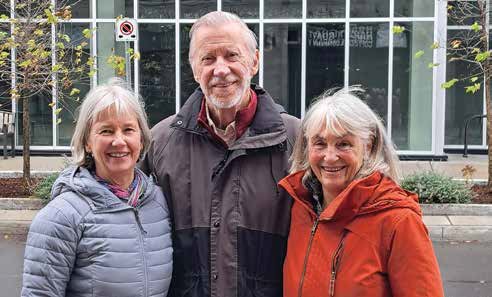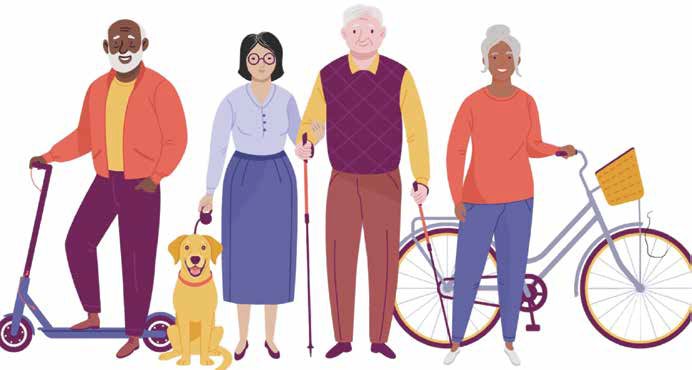Mainstreeter Staff
SHIH will push for change in core communities
New local group to combat
crisis in seniors’ healthcare
There is a healthcare crisis in Canada, make no mistake about it. According
to a recent survey, in Ottawa alone, there are estimated to be some 7,700
seniors living in urban core communities who do not have their own family
doctor. In this issue, The Mainstreeter interviews three member of a new local
volunteer organization, the Seniors Health Innovations Hub (SHIH), and
discovers that the group is already off and running with a focus on enhancing
seniors’ healthcare in six Ottawa communities, including Old Ottawa East.
The Mainstreeter: Your new organization, SHIH, has a focus on seniors healthcare and seems to have evolved recently from what began as Senior Watch Old Ottawa South (SWOOS). Can you take us through this evolution?
Carolyn Inch: The SWOOS organization was founded by Anna Cuylits about six years ago, as a committee of the Old Ottawa South Community Association (OSCA), and it was primarily interested at that time in safety issues for seniors. You may have heard of the “snow moles”. Today, we have six people engaged in SWOOS, with volunteer working groups, and we have expanded our interests to primary care, home care, technology for seniors, housing developments and community support options for seniors in Ottawa. We have looked at whether we could get seniors housing in our communities, and we did a survey and found that people do want next stage housing when they sell their homes.
Eventually, some SWOOS members became very interested in primary health care, especially when media headlines on the issue became prominent, and also when both Terry and I lost our family doctors. That was a good incentive for us, so we conducted a survey on primary care and found that there are an awful lot of seniors that don’t have primary health care. And as we evolved, we realized we needed a larger population base than Old Ottawa South could offer us (6000 population, 17% of which are seniors). So that’s how some of the SWOOS volunteers have decided to focus their activities on senior healthcare through a new organization called SHIH, which will serve all of the central area of Ottawa, encompassing six local core communities, including Old Ottawa East and Old Ottawa South.
Terry Hunsley: SHIH is an organization in the process of formation. It will be independent of OSCA and SWOOS and will have its own board of directors. We’re forming a provisional board now of people who will work to incorporate he organization, get it established with bylaws, objectives, all of those things. And we foresee this being not just an organization of volunteers but one that integrates the participation of various organizations through the community who already have a role and mandate in seniors healthcare. So we want to become an organization which is really broadly representative of the central communities of Ottawa and the institutional infrastructure already in place.

(l to r) Pat Eakins, a member of Senior Watch Old Ottawa South (SWOOS) and a volunteer with the Seniors Health Innovations Hub (SHIH); Terry Hunsley, co-lead of the SHIH Steering Committee; and Carolyn Inch, co-lead of the SHIH Steering Committee. Photo Supplied
As we formalize SHIH, we hope to recruit liaison volunteers from all of the community associations in the central area of Ottawa. We’d love to have someone step forward from Old Ottawa East. We already have volunteers from the Heron Park and Alta Vista communities and have some involvement of volunteers from the Glebe.
Carolyn Inch: Our goal is to take the advice of experts and apply it locally to show that there can be efficiencies in the present system of seniors primary healthcare. The present system has a lot to handle, and we’re going to try to innovate within it. So we will work with homecare caregivers, and with technology. We’re already working with Bruyere Research Institute and with Carleton University and they have a lot of technological solutions, pretty interesting ones. We are anxious to recruit volunteers from the community who will work with us on the technology side of things because we already have experiments we’re working on. And through our website and our new seniors healthcare guide (included with this issue of The Mainstreeter) we have a feedback questionnaire that will help us identify a roster of seniors in need of primary health care.
The Mainstreeter: Can you itemize the specific areas of interest and activity that you foresee for SHIH as it gains traction in central Ottawa?
Terry Hunsley: SHIH is interested first and foremost in healthy aging in the community and helping to keep seniors healthy and independent. Our particular focus includes both primary healthcare for seniors and in-home care, including support for family care providers. Our group also includes a very active committee working on technology, plus a focus on housing options for seniors.
For instance, we have aligned with the Centretown Community Health Centre and with Perley Health, and we have jointly applied for funding for two nurse practitioners, a nurse and some support staff who would be dedicated to serving only unattached seniors in the community. We don’t plan to have a lot of new management and instead are looking at building on to existing infrastructure. So we will be allied with Centretown and with Perley Health and seniors would be able to access teambased medical staff from both centres. Going forward, we would like to work with non-profit homecare groups like Carefor Health & Community Services (Carefor) to provide a more local, innovative approach to homecare because that’s an increasing need for seniors. If we managed to collaborate locally, we feel we could provide primary healthcare more efficiently.
The Mainstreeter: Can you give me your working definition of primary healthcare, since that seems to be the focus of your group’s mandate?
Terry Hunsley: Primary healthcare is a combination of two things. First, it’s health care for issues that can be responded to immediately. And secondly, our primary healthcare providers have historically been the doctors who serve as gatekeepers to the rest of the healthcare system. Now, of course, nurse practitioners have been given broadened powers and can fulfill added roles and duties. They too are within the scope of primary healthcare providers, so that anyone receiving care from either a doctor or a nurse practitioners falls within the definition of primary healthcare.
The Mainstreeter: Let’s talk about the gatekeeper role played by doctors in providing referrals to next level health care services. Does your group regard that process as either inefficient or outmoded and in need of review or reform?
Carolyn Inch: We have internally discussed the fact that instead of doctors and nurse practitioners doing extensive administrative tasks, we should allow those people with the medical knowledge to focus on medical treatment. We plan to work within the existing healthcare system. Our hope is that we can demonstrate a more efficient team-based delivery system, perhaps by having a hub where those patients involved would get a multitude of services, including more efficient homecare.
The Mainstreeter: What are some examples of the inefficiencies that are legacy aspects to the existing overall healthcare system as it relates to seniors, where innovation can assist seniors in accessing primary healthcare?
Terry Hunsley:The most obvious one is relying on family practitioners to provide all of the seniors healthcare. We don’t have enough doctors now, and many of our doctors are retiring, and many of those leaving the practice have many seniors on their caseload. So we’re seeing an increasing number of seniors without any attachment to primary care, and they often end up in emergency rooms.. One of the solutions to that growing problem is to make more use of nurse practitioners to provide primary care. Nurse practitioners in Ontario are already licensed to provide a full range of primary care. The only thing that they’re not allowed to do is bill OHIP. As a consequence, the province has to agree to pay salaries for nurse practitioners and to integrate these nurse practitioners into team-based care. It seems to work very well where it’s implemented, but it’s not spread all over the province. There are only a few nurse practitioner centres in the province, I think maybe 20 or so, and Ottawa, for example, does not have one. So, we are proposing a nurse practitioner centre for seniors.
Carolyn Inch: Another good example of a recent healthcare innovation is the use of pharmacists to provide certain kinds of prescriptions without needing a doctor. We are inviting one or two pharmacists to be involved with us in the hub because there may well be other areas where their role could be increased. We know that in Alberta, for example, pharmacists have a wider range of responsibilities than they have in Ontario. Also, there are other areas of innovation already underway which have potential to develop more, such as telehealth, which could perform a useful gatekeeper function to augment the family doctors.
The Mainstreeter: In your opinion, has Ontario’s healthcare system failed seniors historically? Or are the concerns that motivate your group regarding seniors healthcare more recent developments owing to changes in our society that the healthcare system cannot easily accommodate?
Carolyn Inch: I believe that there has been a failure historically because the system has been and still continues to operate on a fee for service model. I can make an appointment with my doctor online, and it gives me a 10 minute slot. But as you know most people of a certain age have more than one health issue when they go to see their doctor and sometimes merely getting to a doctor’s office is a mobility issue in and of itself. Historically, the basic system was designed at a time when young families were at the core of healthcare delivery. It’s well recognized by now that the system is really outdated. But the real complications now are the demographic pressures. We’ve got some really startling numbers today. We know that 7,700 seniors in central Ottawa are not currently attached to primary care. And that’s only going to increase exponentially as more doctors retire. And the reality is that young doctors now aren’t taking the caseloads that their predecessors did, and so we’re really looking at a difficult situation if we continue to rely exclusively on family physicians.

As their graphic depicts, SHIH seeks to promote healthy, active living for seniors in their communities. Image Supplied
Pat Eakin: I think that the homecare system has not been developed adequately to handle the degree of demand that is unfolding. Homecare policy was designed primarily as a hospital discharge service, and not one that addresses long term care requirements. So our group is also looking at ways to increase the efficiency of homecare service.
The Mainstreeter: Can you offer any examples of how to enhance efficiency in homecare services for seniors?
Carolyn Inch: Right now Carefor has a few nurse clinics, where people who have been discharged from hospitals can go into the clinic if they’re sufficiently mobile to do so. We’d love to have one in Old Ottawa East that would also have Personal Support Workers (PSWs) attached to them that could serve the local community. I think that as the Greystone community here continues to grow in population, a needs argument could easily be made that a clinic of this kind serving seniors that is geographically centric would be worthwhile.
Pat Eakin: Another concern that leads back to homecare is the barrier to access created by simple system navigation. Navigating the healthcare system for individuals is so complex, and especially for seniors. It’s really challenging for most people unless you’re coming out of hospital and the support you are going to receive is laid out for you by the medical staff. We need to be working with Carefor and groups like that to make healthcare navigation more seamless, and easier for seniors. The problem is made more difficult in part because not enough primary care is available. And we continue to jam people into hospital emergency rooms who do not have acute medical situations to deal with. Better, more accessible primary care as part of an integrated system that funds and utilizes community healthcare centres more effectively and that frees up doctors to provide for acute care without putting pressure on emergency care facilities.
The Mainstreeter: Is the focus of your group on fixing Canada’s universal healthcare system or are you more concerned about reforming the provision only of the primary healthcare component of the overall medical system?
Terry Hunsley: I think we’re focusing on innovations to primary healthcare for seniors, to the provision of homecare, to the use of technology, and to personal and social support services. The whole range of these kinds of services to seniors is where we want to focus. We’re not thinking of intervening at the level of legislation on the universal health care system. We believe in a universal public healthcare system, but we are fully aware that within that system there are already doctors and hospitals engaged in private business or private nonprofits. We understand there’s a huge mix within there, but it’s guided by a universal system that we continue to support.
Carolyn Inch: Interestingly, we’ve got a group of family doctors in Ottawa who are very caring, and we’ve worked with them, and we have their endorsements. Family practitioners are well aware of the shortages in their ranks, and they have solidly endorsed us with a letter saying yes, do this kind of work. But at the provincial level, the Ontario Medical Association, under the current provincial government, has recently become more supportive of the privately funded model and they’re more focused than in the past on some of those initiatives. We’re working with our MPP to try and get an endorsement at the OMA level for seniors healthcare innovation, and it would be very valuable to us to get that kind of support.

The core areas of SHIH’s focus on senior’s health include primary care, homecare and the use of innovative technologies to enhance health care efficiency and delivery. Photo Supplied
The Mainstreeter: In your opinion, based upon your experiences, is the increasing privatization of our healthcare system detrimental to seniors health? Terry Hunsley: I think it can be detrimental to seniors health, especially if it leads to a system where people who are more affluent bid up the cost of access to healthcare and pay increasing amounts to get privileged access to healthcare. And very often, in these cases, people who might need it more are not able to get treatment because they’re left in the back of the line. And when you introduce that kind of competition into the system, the people who have the money will get the care and the people who don’t have the funds, don’t get the care.
The Mainstreeter: It sounds like SHIH is getting good support from local health care organizations with which you’re aligned like Centretown Community Health Care and Perley Health. But have you encountered points of resistance and barriers from certain stakeholders in the delivery of health care to seniors?
Terry Hunsley: We have worked closely and cooperatively with hospitals and doctors in our technology group. For example, we have people from the University of Ottawa medical school and people from Bruyere Health Centre that believe in what we are doing. I think that local hospitals would love to see us do anything that would help to divert people from showing up in emergency rooms or being brought into institutional care before they really need to be. So, for people working in the system, we’ve had a lot of encouragement and support. There is a level of obstacle, obviously, when you come to the provincial government and to the need for institutional funding support for areas of innovation. We know that it’s a provincial health system that has to implement a broad overall service system, so we understand our role is to demonstrate that specific healthcare innovations for seniors can work. And we are excited to try to do exactly that going forward.
![]() SHIH is looking for two categories of volunteers – 1) provisional board members who can put in the time and efforts to help make the organization successful. 2) healthcare experts who aren’t looking to sit on a board and who can serve as advisors to SHIH and to act as liaison with existing organizations on various projects. Beyond volunteers, SHIH encourages all seniors residing in central Ottawa who do not have their own doctor to respond to the group’s feedback questionnaire in the Guide to Aging. The questionnaire is designed to give community feedback to inform the work of SHIH on diverse facets of healthy aging in the community. For more information visit https://oldottawasouth.ca/healthy-aging-guide/the-time-is-now-the-seniors-health-innovations-hub-shih/
SHIH is looking for two categories of volunteers – 1) provisional board members who can put in the time and efforts to help make the organization successful. 2) healthcare experts who aren’t looking to sit on a board and who can serve as advisors to SHIH and to act as liaison with existing organizations on various projects. Beyond volunteers, SHIH encourages all seniors residing in central Ottawa who do not have their own doctor to respond to the group’s feedback questionnaire in the Guide to Aging. The questionnaire is designed to give community feedback to inform the work of SHIH on diverse facets of healthy aging in the community. For more information visit https://oldottawasouth.ca/healthy-aging-guide/the-time-is-now-the-seniors-health-innovations-hub-shih/






